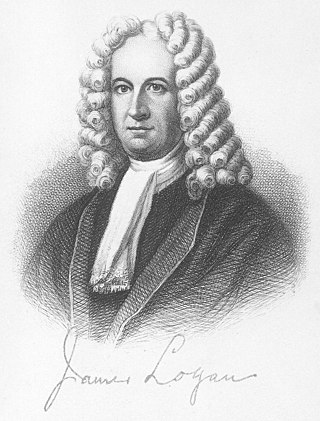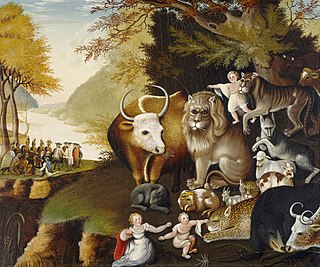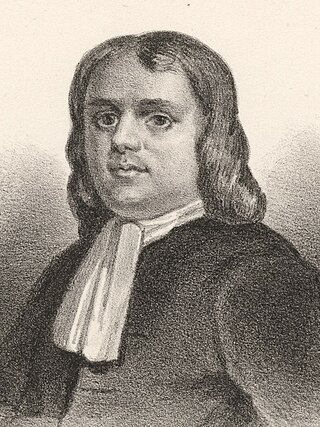Related Research Articles

Benjamin Franklin was an American polymath: a leading writer, scientist, inventor, statesman, diplomat, printer, publisher and political philosopher. Among the most influential intellectuals of his time, Franklin was one of the Founding Fathers of the United States; a drafter and signer of the Declaration of Independence; and the first postmaster general.

Benjamin Chew was an American lawyer and judge who served as the chief justice of the Supreme Court of the Province of Pennsylvania and later the Commonwealth of Pennsylvania. Born into a Quaker family, Chew was known for precision and brevity in his legal arguments and his excellent memory, judgment, and knowledge of statutory law. His primary allegiance was to the supremacy of law and the constitution.

The Province of Pennsylvania, also known as the Pennsylvania Colony, was a British North American colony founded by William Penn, who received the land through a grant from Charles II of England in 1681. The name Pennsylvania was derived from "Penn's Woods", referring to William Penn's father Admiral Sir William Penn.

Joseph Galloway was an American attorney and a leading political figure in the events immediately preceding the founding of the United States in the late 18th-century. As a staunch opponent of American independence, he would become one of the most prominent Loyalists in North America during the early part of the Revolutionary War.

Anthony Benezet was a French-born American abolitionist and teacher who was active in Philadelphia, Pennsylvania. A prominent member of the abolitionist movement in North America, Benezet founded one of the world's first anti-slavery societies, the Society for the Relief of Free Negroes Unlawfully Held in Bondage. He also founded the first public school for girls in North America and the Negro School at Philadelphia, which operated into the nineteenth century. Benezet advocated for kind treatment of animals, racial equality and universal love.

Pennsylvania Hospital is a private, non-profit, 515-bed teaching hospital located at 800 Spruce Street in Center City Philadelphia, The hospital was founded on May 11, 1751 by Benjamin Franklin and Thomas Bond, and was the second established public hospital but had the first surgical ampitheatre in the United States. and its first medical library. It is part of the University of Pennsylvania Health System.

James Logan was a Scots-Irish colonial American statesman, administrator, and scholar who served as the fourteenth mayor of Philadelphia and held a number of other public offices.

The Religious Society of Friends began as a proto-evangelical Christian movement in England in the mid-17th century in Ulverston. Members are informally known as Quakers, as they were said "to tremble in the way of the Lord". The movement in its early days faced strong opposition and persecution, but it continued to expand across the British Isles and then in the Americas and Africa.

Liberty Displaying the Arts and Sciences, or The Genius of America Encouraging the Emancipation of the Blacks (1792) is an oil-on-canvas painting by the American artist Samuel Jennings. Held in the permanent collection of the Library Company of Philadelphia, this work is the earliest known American painting promoting abolitionism in the United States.

Benjamin Lay was an English-born writer, farmer and activist. Born in Copford, Essex into a Quaker family, he initially underwent an apprenticeship as a glovemaker before running away to London and finding work as a sailor. In 1718, Lay moved to the British colony of Barbados, which operated on a plantation economy dependent on slave labour. While working as a merchant, his shock at the brutal treatment of slaves in Barbados led Lay to develop lifelong abolitionist principles, which were reinforced by his humanitarian ideals and Quaker beliefs.

The "Holy Experiment" was an attempt by the Religious Society of Friends, also known as Quakers, to establish a community for themselves and other persecuted religious minorities in what would become the modern state of Pennsylvania. They hoped it would show to the world how well they could function on their own without any persecution or dissension.

William Smith was an Episcopal priest who served as the first provost of the College of Philadelphia, which became the University of Pennsylvania. He founded Washington College in Chestertown, Maryland, and St. John's College in Annapolis, Maryland. He founded the borough of Huntingdon, Pennsylvania, where he was a significant land owner.

Robert Hunter Morris, was a prominent governmental figure in Colonial Pennsylvania, serving as governor of Pennsylvania and Chief Justice of the New Jersey Supreme Court.

Isaac Norris was a merchant and statesman in the colonial-era Province of Pennsylvania, in British America.
William Coleman was a merchant, lawyer, municipal official, and judge in colonial Philadelphia.

William Penn was an English writer, religious thinker, and influential Quaker who founded the Province of Pennsylvania during the British colonial era. Penn, an advocate of democracy and religious freedom, was known for his amicable relations and successful treaties with the Lenape Native Americans who had resided in present-day Pennsylvania prior to European settlements in the state.

The Penn's Creek massacre was an October 16, 1755 raid by Lenape (Delaware) Native Americans on a settlement along Penn's Creek, a tributary of the Susquehanna River in central Pennsylvania. It was the first of a series of deadly raids on Pennsylvania settlements by Native Americans allied with the French in the French and Indian War.
Francis Rawle, originally from England, was a Quaker and colonist in Philadelphia, where he served in administrative positions and was a member of the assembly.
Friends meeting houses are places of worship for the Religious Society of Friends, or Quakers. A "meeting" is the equivalent of a church congregation, and a "meeting house" is the equivalent of a church building.
The Proprietary Party, also known as the Gentleman's Party, was a political party in the Pennsylvania Colony, primarily concerned with Anglicanism and supporting the rights of the colonies hereditary proprietors, the Penns. They were typically in opposition to the Quaker Party, which sometimes resulted in violence.
References
- ↑ "1681-1776: The Quaker Province | PHMC > Pennsylvania History". www.phmc.state.pa.us. Pennsylvania Historical and Museum Commission. Retrieved 22 May 2021.
- ↑ "Quakers". History. History. Retrieved 22 May 2021.
- ↑ Zimmerman, John J. (1960). "Benjamin Franklin and the Quaker Party, 1755-1756" . The William and Mary Quarterly. 17 (3): 292–293. doi:10.2307/1943442. ISSN 0043-5597 . Retrieved 22 May 2021.
- ↑ Zimmerman, John J. (1960). "Benjamin Franklin and the Quaker Party, 1755-1756" . The William and Mary Quarterly. 17 (3): 293. doi:10.2307/1943442. ISSN 0043-5597 . Retrieved 22 May 2021.
- ↑ Thayer, Theodore (1947). "The Quaker Party of Pennsylvania, 1755-1765". The Pennsylvania Magazine of History and Biography. 71 (1): 21. ISSN 0031-4587 . Retrieved 22 May 2021.
- ↑ Wedeking, Jim. "QUAKER STATE: PENNSYLVANIA'S GUIDE TO REDUCING THE FRICTION FOR RELIGIOUS OUTSIDERS UNDER THE ESTABLISHMENT CLAUSE" (PDF). NYU Journal of Law & Liberty: 52. Retrieved 22 May 2021.